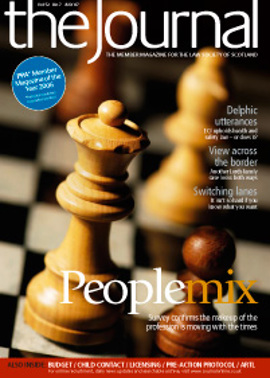A chance to shine

When in April 1989, the Society ‘s Law Reform Committee first established a mental health working party, which soon became the Mental Health and Disability Committee, it was responding to a need which at that time was appreciated by only a few people in Scotland. Mental health law was not then, and is not now, generally taught at university, except as a very small part of specialist medical law courses. Incapacity law, though practised, was unrecognised as a subject, under that or any other name.
Very few saw these areas of law as of interest, even though many clients suffered from the effects of their shortcomings. The law was fragmented and piecemeal. Mental health law was to be found mainly in the Mental Health (Scotland) Act 1984, a consolidation of amendments to the Mental Health (Scotland) Act 1960, plus further piecemeal amendment. Incapacity law was still rooted in Roman law, in legislation from the Tutors Act 1474 to the Judicial Factors Act 1849, and in case law, much of it ancient.
A progressive system
The Society can congratulate itself on its foresight. From the outset, the Mental Health and Disability Committee has taken a leading role in promoting reform of Scottish mental health and incapacity law, lobbying for change, taking part in consultations, organising conferences and forging alliances. It is to a significant extent a result of the Society’s contribution that, with the Adults with Incapacity (Scotland) Act 2000, as recently updated, and the Mental Health (Care and Treatment) (Scotland) Act 2003, Scotland now has a coherent system of mental health and incapacity law, which is regarded by many observers, including those south of the border and overseas, as an example of progressive, humane legislation.
Members of the committee have been called to give evidence and advice in the other jurisdictions of the United Kingdom and internationally (with direct input to at least 21 countries). As the subjects have developed, so has the strength and depth of the committee, which is probably unique in bringing together the authors (or at least one of the joint authors) of almost all of the main Scots law texts ever written exclusively on its subjects. Current members have authored 10 books on these subjects, one published in six languages.
Huge need
Mental health law and incapacity law raise many challenges for practitioners. They face issues of discrimination and ethics, tax and welfare benefits, as well as the need to navigate and untangle a range of complex financial, medical and social arrangements.
A number of practitioners are now finding this a satisfying area of work, and there is no doubt that, in so doing, they are meeting a real legal need. Mental health problems affect one in four Scots. Over 60,000 people in Scotland have dementia and there are around 120,000 with learning disabilities. Similar legal issues affect people disabled by strokes, head injuries, and some physical illnesses, such as multiple sclerosis and Parkinson’s disease. This branch of the law also covers many people in end-of-life situations.
The Society has now introduced two specialist accreditation schemes for practitioners, thus recognising both mental health law and incapacity law as distinct branches of legal study. There are two separate schemes, although practitioners may, of course, qualify for both.
Incapacity: broad understanding
Accreditation in incapacity law requires expert understanding of relevant law, plus substantial experience in the techniques and measures for making provision in anticipation of possible future incapacity, and in consequence of existing impairment of capacity. Such provision may relate to personal welfare and decision-making, and also to management of property and finances. An applicant must also show understanding of the measures and techniques by which third parties may make appropriate inter vivos or testamentary provision where any beneficiary has or may have impairment of capacity and/or special needs. This includes techniques and measures under the 2000 Act, and relevant techniques and measures outwith that Act.
Applicants should be able to show their ability in, and experience of, communicating with people with communication difficulties and/or impairments of capacity, and at least a working knowledge of the following areas of law: mental health, undue influence, facility and circumvention, vulnerable adults, disability discrimination, human rights, and special educational needs. Some specialists in incapacity and disability law will be almost entirely chamber practitioners: at the other end of the scale, expertise only in court procedures under the Incapacity Act is unlikely to suffice.
Mental health: different skills
Mental health accreditation would traditionally have been of interest to court-based solicitors, as it primarily involves advising clients facing compulsory measures before the new Mental Health Tribunal for Scotland. While there are some specialised law firms offering advice and assistance, mainly in the central belt, anecdotal evidence is that outside these areas it can be difficult to find legal representation. We believe research is needed into this area of possible unmet legal need, with a view to encouraging the development of new services.
As well as being able to demonstrate a full understanding of the principles and practice of the Mental Health (Care and Treatment) Act, a solicitor seeking mental health accreditation will need to show familiarity with issues relating to medical treatment and patients’ rights, and understanding of the interface both with criminal law and with incapacity and disability law.
It is to be hoped that the advent of specialist accreditation may encourage some solicitors to consider whether this type of work might attract them. Working with some of our most vulnerable citizens can be both challenging and satisfying. Seeking and obtaining specialist accreditation does not imply that the solicitor must specialise exclusively in that area: this area of work could complement an existing court or chamber practice. Non-court lawyers might also consider tribunal work. The more informal nature of the proceedings requires different skills, and, indeed, some court lawyers may find it difficult to moderate their style for the tribunals. In these sensitive cases there is no room for an aggressive or flamboyant litigator.
Distinctively Scottish
One of the attractions of working in these areas of law is that things never stand still. Future developments include the new procedures for protecting vulnerable people in the Adult Support and Protection (Scotland) Act 2007, controversial barring provisions in the Vulnerable Groups (Scotland) Act 2007, and the need to ensure that people with mental disabilities will receive adequate protection against discrimination following the merger of the Disability Rights Commission in the new Commission for Equality and Human Rights.
With the development of human rights law, we can expect to see some interesting challenges to Scottish law and practice in areas as diverse as rights to adequate medical treatment, conjugal visits and medical confidentiality. As case law develops in the sheriff court, and the Mental Health Tribunal for Scotland grows in confidence, both incapacity and mental health law and practice will be able to develop along uniquely Scottish lines. It is to be hoped that the Scottish legal profession will rise to the challenge and that the Society will continue to support and promote development of both the law and the provision of legal services.
Adrian Ward, of Turnbull and Ward, Barrhead, is Convener of the Mental Health and Disability Committee. His latest book is Adult Incapacity (W Green).
Hilary Patrick, an honorary fellow at Edinburgh University, is vice convener of the committee. Her latest book is Mental Health, Incapacity and the Law in Scotland (Tottel Publishing).
In this issue
- The power of marks: Frankie goes after Hollys name
- Confidentiality clauses - beware!
- Into the fast lane
- All change please...!
- Benchmark for practice
- Old, new, borrowed and blue
- Old, new, borrowed and blue (1)
- The Oracle has spoken
- High road, low road
- Point of contact
- Stuck in a rut?
- Counsel's fees - a reply
- Fraud: no hiding place
- A chance to shine
- CDD is the new ID
- System integrity
- Professional negligence: Pre-Action Protocol
- Not just a fancy name
- More on "enough is enough"
- Are you up to the Act?
- Saving energy - and effort
- Takeover goals
- Expensive consequences
- Expensive consequences (1)
- Scottish Solicitors' Discipline Tribunal
- Website reviews
- Book reviews
- Time (to prepare) please!
- ARTL - now and then?






